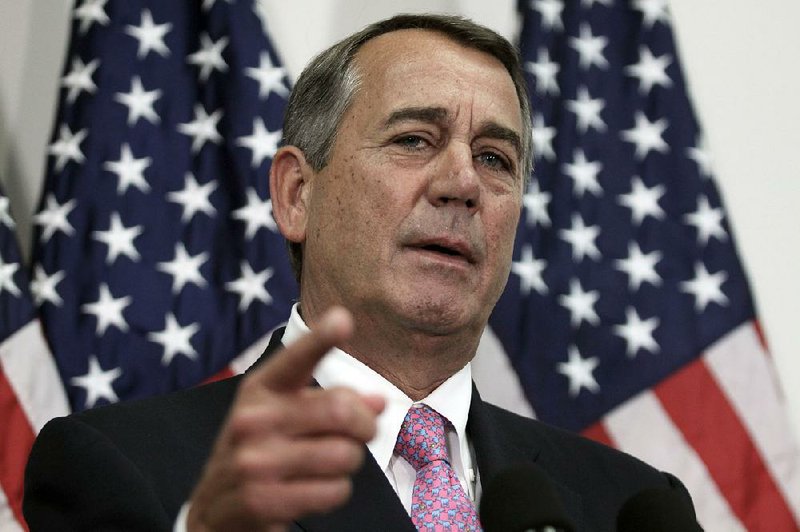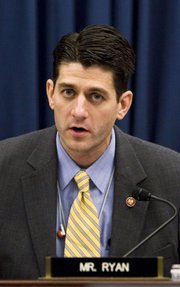WASHINGTON -- Congressional leaders and the White House united Tuesday behind a budget and debt deal that would end the threat of government shutdowns and defaults until well after a new president takes office.
The outgoing House speaker, John Boehner, R-Ohio, will try to push the deal through his chamber today as his last act before departing Congress at the end of the week.
Boehner is resigning under pressure from conservative Republicans. Rank-and-file House Republicans, in particular, have been resistant to authorizing an increase in the debt limit without some accompanying adjustments to mandatory federal spending programs.
Critics of the deal acknowledged they were powerless to stop an agreement likely to pass with votes from Democrats and a sizable number of Republicans. Boehner brushed off their complaints, declaring that he intended to make good on his promise to leave a "clean barn" for Rep. Paul Ryan of Wisconsin, whom many Republicans are supporting for the party's nomination for speaker today and who will face an election on the House floor Thursday.
"I didn't want him to walk into a dirty barn full of you-know-what. So I've done my best to try to clean it up," Boehner told reporters after a private gathering of House Republicans, his last such weekly meeting after nearly five years as speaker and a quarter-century on Capitol Hill.
During the meeting, Republican lawmakers had a parting gift for Boehner: a golf cart with Ohio license plates reading "MR SPKR."
Boehner told them he had a gift in return: the budget deal.
The deal would boost military spending as sought by defense hawks, even as it would take away the threat of "fiscal cliffs" by a GOP-led Congress in the middle of a campaign season in which Republicans are aiming for the White House and trying to hang onto their Senate majority.
Struck over recent days in closely held talks with White House officials and top House and Senate leaders of both parties, the agreement would raise the government debt ceiling until March 2017, removing the threat of a national default days from now.
The Treasury Department has said the government will default on its debt if the statutory borrowing limit is not raised by Tuesday. And a temporary spending measure, which kept the government from shutting down at the start of October, will run out Dec. 11.
At the same time, the deal would set the budget of the government through the 2016 and 2017 fiscal years and ease spending caps by providing $80 billion more for military and domestic programs.
Those increases would be offset by cuts in spending on Medicare and Social Security disability benefits, as well as savings or revenue from an array of other programs, including auctioning off portions of government-owned broadcast spectrum, selling oil from the Strategic Petroleum Reserve and cracking down on audits of large business partnerships.
The Medicare savings would come from cuts in payments to doctors and other health care providers. Aides said the Social Security Disability Insurance program would be amended, in part to tighten and standardize eligibility requirements that now vary by state. That change was projected to save the government $5 billion.
The $80 billion increase amounts to a little more than 1 percent per year of the nearly $4 trillion annual federal budget, but it carries the significance of breaking through agreed-upon spending caps that Republicans had praised as a rare display of responsible cost control and Democrats had criticized as a drag on economic growth.
The emerging deal would also reallocate funds among Social Security program trust funds to ensure solvency of the disability insurance program. The prospective agreement would also prevent expected increases in out-of-pocket costs for millions of Medicare Part B beneficiaries.
President Barack Obama said the budget deal "reflects our values" and responsibly pays for investments in the middle class and national security.
"It's an actual bipartisan compromise, which hasn't been happening in Washington a lot lately," the president said.
Said Vice President Joe Biden: "It will prevent us from lurching from crisis to crisis."
Senate leaders said Tuesday that they expect to move quickly if the House approves the deal. "I'm hopeful and optimistic that that bill will come over to the Senate, and when it does, we'll take it up," said Majority Leader Mitch McConnell, R-Ky.
Deal draws criticism
Critics of the deal, who said Boehner was pushing through one last measure negotiated solely by the leadership, quickly began venting their anger on Twitter using the hashtag #zombiebudget.
Rep. Justin Amash, R-Mich., who is a member of the conservative House Freedom Caucus, had posted his annoyance earlier, saying, "It's another 'govern by crisis' deal that doesn't reflect the will of the House but rather the will of the speaker."
Many conservatives criticized the deal even before it was released shortly before midnight Monday.
"I would say that we're very skeptical at this point," said John Fleming, R-La. He added that some members, including Budget Committee Chairman Tom Price, R-Ga., confronted Boehner at a Monday night meeting on the outlines of the deal, accusing him of going around committee chairman.
"He threw the committee chairmen under the bus," Fleming said.
One of the conservatives, Rep. Thomas Massie, R-Ky., complained of the deal and Boehner: "We can't stop it. He's in league with the Democrats."
But Massie also said that "it's a long game" and that conservatives are winning the war after forcing Boehner to resign and cowing his heir apparent, Majority Leader Kevin McCarthy, R-Calif., into dropping his candidacy for speaker. That caused a power vacuum until GOP leaders prevailed upon a reluctant Ryan, the party's 2012 vice presidential nominee, to seek the speakership.
Despite conservatives' anger over the budget deal, hard-liners were reluctant to take their anger out on Ryan, who said he had no role in the agreement and criticized how it came about.
"I think this process stinks. This is not the way to do the people's business," Ryan said. "Under new management, we're not going to do the people's business this way."
Sen. Rand Paul, R-Ky., pledged that he'll try to scuttle the deal.
"I will filibuster the new debt-ceiling bill," Paul said at an event on the University of Colorado's Denver campus. "It is horrible. It's hard for me not to use profanity describing it."
Paul also called the bill a "steaming pile of legislation" and urged fellow Republicans to join him in opposing it.
Bank bill advances
With Boehner's backing, the House moved with rare bipartisanship -- employing an even rarer legislative maneuver -- toward resolving another issue on the speaker's to-do list: reauthorization of the 81-year-old Export-Import Bank, the government's lender of last resort for U.S. exporters. The House voted 246-177, to wrest a bill that would revive the bank's charter from a committee chairman and set it up for House passage on Tuesday.
About a fourth of Republicans joined all Democrats who were present in support of advancing the bill over the opposition of deep-pocketed conservative groups and the banking committee's chairman, Rep. Jeb Hensarling of Texas. Reps. French Hill, Steve Womack, and Bruce Westerman, all Arkansas Republicans, voted against advancing the bill. Rep. Rick Crawford, R-Ark., did not vote.
Opponents say the bank amounts to corporate welfare. Supporters argue that it promotes job creation by assisting export industries and earns money for the Treasury in the process. The bank has not been able to conduct new business since its charter lapsed in June.
Information for this article was contributed by Erica Werner, Alan Fram, Andrew Taylor, Stephen Ohlemacher and Mary Clare Jalonick of The Associated Press; by David M. Herszenhorn, Julie Hirschfeld Davis and Jackie Calmes of The New York Times; and by Kelsey Snell, Mike DeBonis and David Weigel of The Washington Post.
A Section on 10/28/2015



